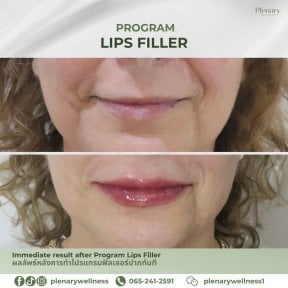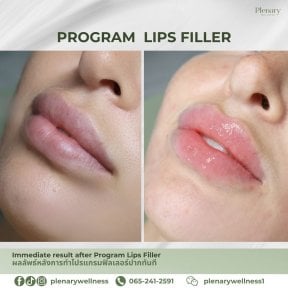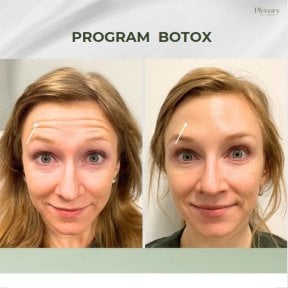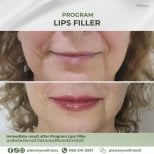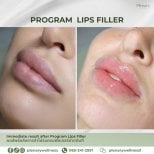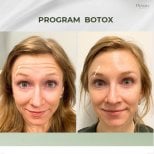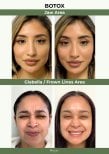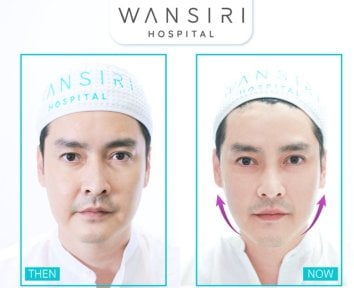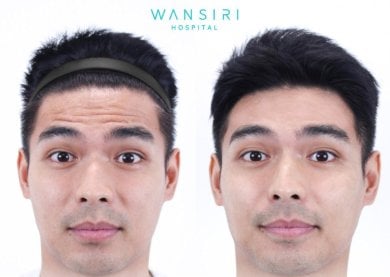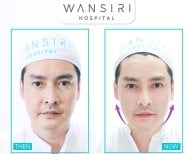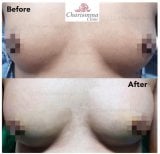Dr. Thamonwan Trongpanyachot (Dr. Bee) has performed 900 Botox procedures over 17 years, specializing in natural-looking results. Treatment with Nabota 100 units from Korea may cost around $380, typically including the injection, consultation, and follow-up. The clinic offers choice of FDA-approved brands from USA, Germany, and Korea. Dr. Bee trained at Medical University of Lublin and collaborates with Prince of Songkla University for research-backed techniques.
How it works
How Much Does Botox for forehead Cost in Thailand?
The cost of Botox for the forehead in Thailand typically ranges from $11 / ฿374 to $500 / ฿17,000. Prices vary depending on the clinic, the experience of the injector (dermatologist or plastic surgeon), the brand of botulinum toxin used (such as Botox®, Dysport®, Xeomin®), and the number of units required. In the United States, the average cost is $800 / ฿27,200 (per ASPS). Botox for the forehead in Thailand is about 75% less than in the U.S.
Thai clinics usually include the initial consultation, the Botox injection, and a follow-up visit if needed in the price. In the U.S., the quoted price often covers only the injection itself, with separate charges for consultations and touch-ups. Always confirm what’s included at your chosen clinic.
Key Benefits
- Get Botox for forehead in Thailand at 60-75% less than in the USA and Australia.
- Top botulinum toxin brands available: Botox®, Dysport®, and Xeomin®.
- Free photo review by a doctor to determine the best option for your forehead rejuvenation.
- 100% data protection and confidentiality guarantee.
- Access exclusive deals from leading Thai clinics from $220.
| Thailand | Turkey | The USA | |
| Botox for forehead | from $11 / ฿374 | from $150 / ฿5,100 | from $500 / ฿17,000 |
Medically reviewed by
Fahad MawloodDiscover the Best Botox for forehead Clinics in Thailand: 4 Verified Options and Prices

This package features 100 units of premium Korean Aestox Botox for longer-lasting smoothing effects. Dr. Pimpa Tantanasrigul performs the quick, minimally invasive treatment at the internationally-focused Wansiri Hospital, which sees over 2,000 foreign patients annually. The clinic maintains a 99.0% success rate for plastic surgeries. It costs around $380, covering the premium Botox units, a doctor consultation, and convenient amenities.
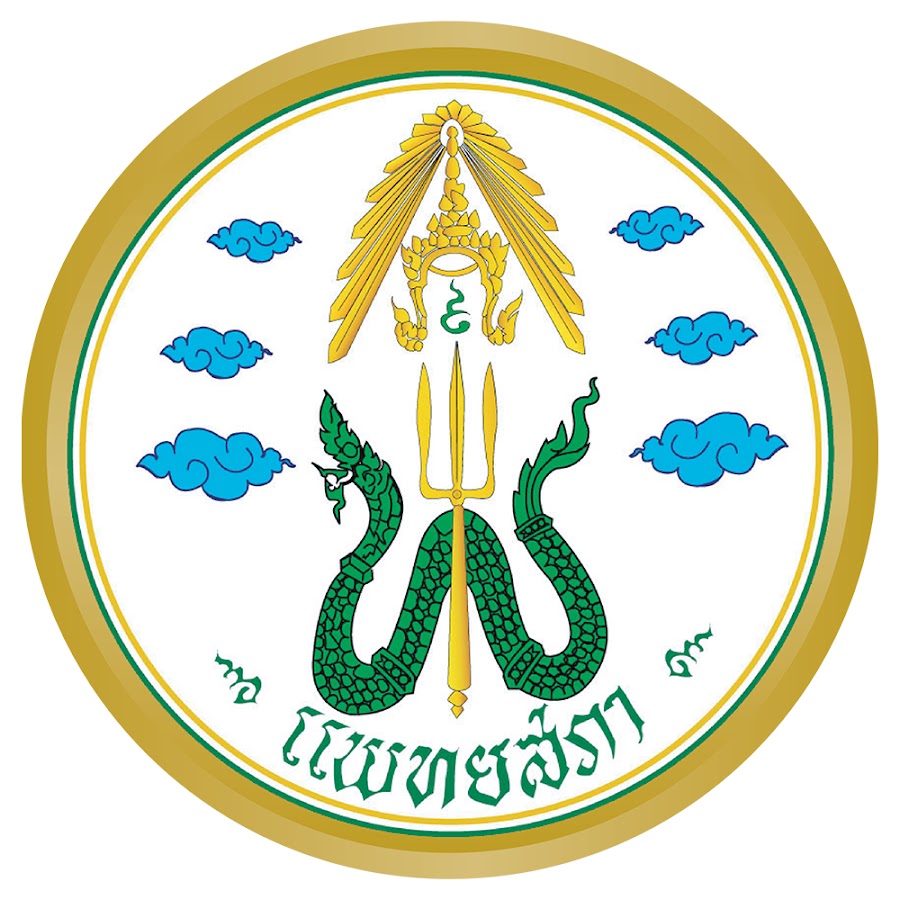
Dr. Pimchaya Panichkul performs premium Botox injections with 100 units, having completed 900+ procedures over 23 years. The treatment may cost around $750-$1,000 USD, typically covering injections, physician fees, and a 1-day hospital stay. Trained in the US, Germany, and Korea, Dr. Panichkul brings international expertise in facial aesthetics to Charismma Clinic, which specializes in natural-looking cosmetic enhancements.
Botox for forehead Overview in Thailand
- Botox injections - from $318This therapy, using Botulinum toxin, smooths wrinkles by relaxing facial muscles, offering a youthful appearance.
- Botox for men - from $6This therapy offers men a younger look by reducing wrinkles, using injections with minimal recovery time.
- Botox for forehead - from $11This therapy reduces forehead wrinkles via muscle-relaxing injections, providing a youthful, smooth appearance.
- Botox under eyes - from $99The procedure softens under-eye wrinkles through small, targeted injections, providing a youthful, refreshed look.
- Botox wrinkles - from $6This therapy aims to smooth out facial lines using botox injections, providing a younger and refreshed appearance.
- Preventative botox - from $99This therapy is early use of tiny botox injections to deter future wrinkles, preserving youthful skin with minimal discomfort.
- Lip Flip - from $250A non-surgical cosmetic procedure that uses Botox injections to relax the upper lip muscles, creating a fuller appearance by subtly flipping the lip outward.
Day 1 - Arrival
- Arrive in the country.
- Arrange for your own accommodation and transfer.
Day 2 - Pre-Operation
- Consultation with a specialist.
- Perform necessary medical tests, if needed.
Day 3 - Botox Procedure
- Procedure takes place in clinic.
- Botox is injected into forehead muscles.
- Process lasts approximately 15-30 minutes.
- No anesthesia is required.
- You can leave the clinic immediately after.
Day 4 and Week 1 - Post-Operation
- Minor swelling or bruising may occur.
- Avoid strenuous physical activities for 24 hours.
Week 2 - Rehabilitation
- Return to work and normal activities.
- Optimal results visible within 14 days.
Please note that each patient"s experience may vary based on individual factors.
- Bookimed deposit: $200 or €200.
- Clinic deposit: Pay a set percentage in advance.
Our Trusted Doctors
View all DoctorsDr Phatcharasak Kraisornphongsakul Md
Dr. Phatcharasak Kraisornphongsakul specializes in cosmetic treatments at ID Clinic Bangkok.
Bee Thamonwan
Dr. Bee specializes in natural-looking Botox treatments at Plenary Wellness, combining medical expertise with an artistic eye for facial harmony.
- Trained at Medical University of Lublin in Poland
- Focuses on anti-wrinkle injections and facial contouring
- Works with Prince of Songkla University on wellness research
- Offers personalized treatment plans for natural results
Doctor Sirintip Jira-adisai
Dr. Sirintip specializes in Anti-Aging Medicine and Dermatology, helping patients achieve youthful skin at Asia Cosmetic Hospital.
- Years of experience in Anti-Aging Medicine and Dermatology
- Specialized training in Regenerative Medicine
- Works with state-of-the-art facilities in Bangkok
Pimpa Tantanasrigul
Dr. Pimpa Tantanasrigul specializes in anti-aging treatments with advanced training from Imperial College London and Juntendo University.
- Board-certified in dermatology and preventive medicine
- Expertise in Botox and dermatosurgery techniques
- Trained in Japan and the UK with government scholarships
- Member of the American Board of Anti-Aging and Regenerative Medicine
Video Stories from Bookimed Patients
Reviews about Bookimed: Discover Patients' Insights
All reviewsBotox for forehead: Before & after photos
View allShare this content
Fast Facts about Botox for forehead
Botox for Forehead
Botox for the forehead involves injecting a neurotoxin to relax muscles and reduce wrinkles.
FAQ about Botox for forehead in Thailand
What should you know about Thailand before the trip?
Official name | The Kingdom of Thailand |
Currency | Thai Baht (you also can pay for services in dollars) |
Best period for the trip | November-early April |
Language | Thai (most of medical staff speaks English fluently) |
Visa | is required for a trip of 3-6 months |
Time difference with Europe | 7 hours |
Time difference with the USA | 12 hours |
Capital | Bangkok |
Medical tourism center | Bangkok |
Popular resorts | Koh Samui, Phuket, Chiang Mai, Koh Chang, Hua Hin |
What is the level of medicine in Thailand?
Healthcare is the key development sector of the Thai government. The Thai authorities are convinced that care for the citizens' health should be an absolute priority of state policy and spend about 25 billion baht for healthcare annually.
As a result, 36,673 medical facilities provide excellent medical care in the country. 64 centers in the Kingdom have certificate of JCI (Joint Commission International), the international improver of healthcare quality and safety across the globe. The index of certificates obtained is the largest. To compare, Israel has 20 JCI-accredited facilities, and Germany — only 10 clinics of this type.
What hotel service is provided here?
In the Kingdom of Thailand, hotels of different price ranges and service levels are presented. The level of Thai hotels is comparable to hotels in Tunisia, Morocco or Egypt. Most tourists choose 4 and 5 star hotels with all-inclusive meals. Such hotels have everything for a comfortable stay: varied food, a large well-groomed territory, animation for children and adults. Some hotels have their own water park, which guests can use for free. Budget travelers can afford to book an economical 3-star hotel with half board or no meals at all.
When is the best time to travel to Thailand?
The main advantage of Thai resorts is the long beach season. On the east coast and west coast the climate features are different, so take it into account when planning the trip. The best time to travel is during the cool and dry season between November and early April. A large influx of tourists is in March-May, when the air temperature is +30°C.
Do I need a visa?
For now, the Kingdom of Thailand requires different visa regimens for diverse states. Some foreigners can stay in the country 60 days without visa control, some of them — only 14 days.
How long you can stay in Thailand and what countries can cross the border easy read here.
What documents are required to apply for a visa to Thailand for treatment?
Visas for travel to Thailand require a number of documents. The necessary papers can be submitted 90 days before the planned departure. The list of documents includes:
- ID card
- confirmation of online registration and filling out the questionnaire
- certificate of income and availability of funds (20,000 baht per person/40,000 baht per family)
- insurance policy for a stay in Thailand (original and copy)
- 2 photos (4x6)
- visa receipt
- booking of round-trip air ticket (paid in full) and hotel
- medical opinion about the need for treatment.
